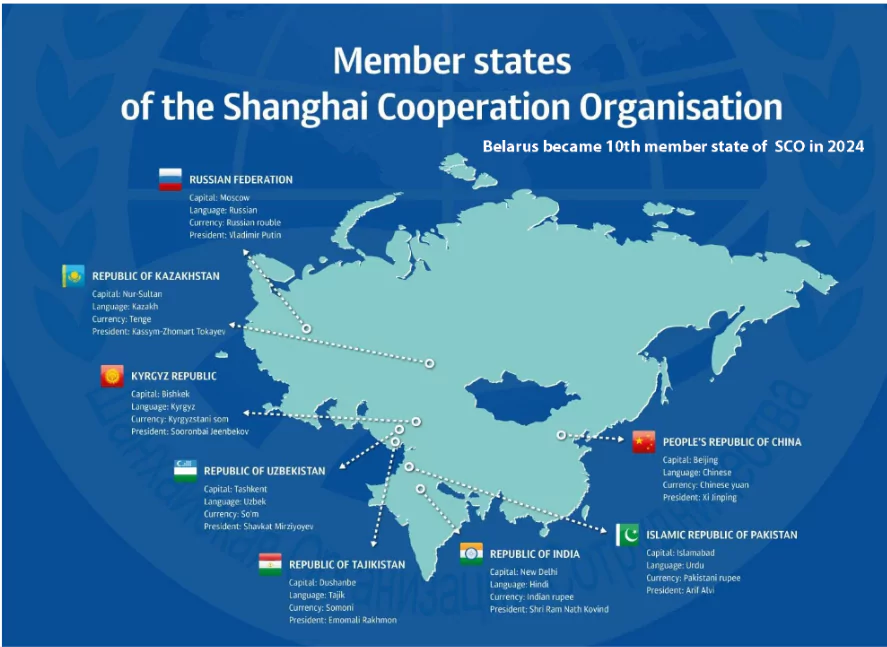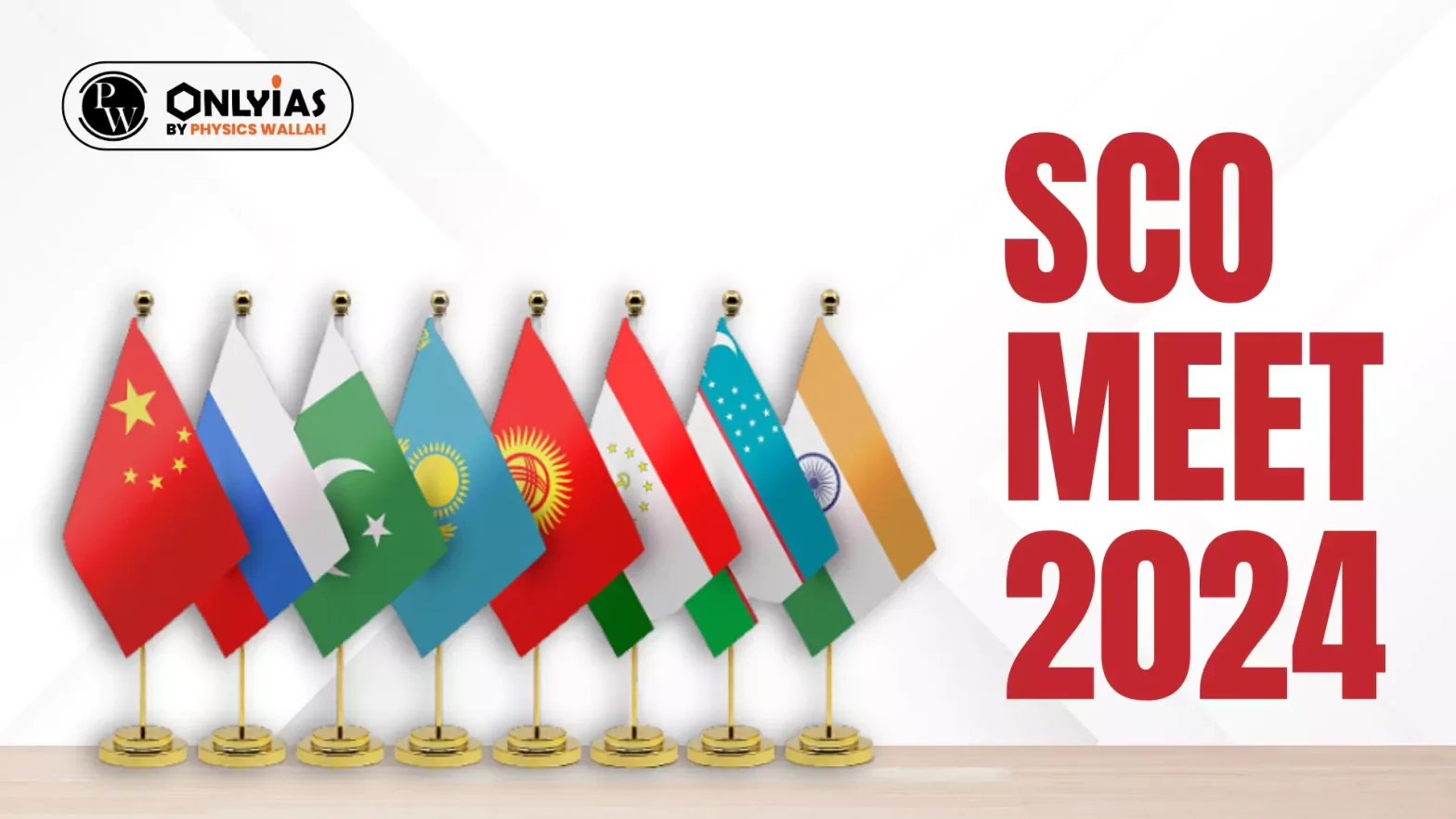The 23rd Meeting of the Council of Heads of Government of Member States of the SCO was held on October 15 and 16 in Islamabad, Pakistan.
Pakistan PM Shehbaz Sharif Leads SCO Summit 2024 on Regional Cooperation and Security
- Chaired by: Pakistan Prime Minister Shehbaz Sharif
- Agenda: The summit’s agenda focused on enhancing regional cooperation in various fields, including economy, trade, environment, sociology and culture.
- Important discussions were expected on regional security, economic cooperation and counterterrorism.
- 24th Meeting of the Council of Heads of Government to be held in Russia in October 2025.
Enroll now for UPSC Online Course
Key Highlights of the 23rd Meeting of the Council of Heads of Government
- Economic Cooperation: Focus on sustainable economic growth, green development, and digital economy, with emphasis on MSMEs and job creation.
- Support for BRI: Reaffirmed support for China’s Belt and Road Initiative and its integration with the Eurasian Economic Union.
- India opposed the One Belt, One Road initiative as the project includes the China-Pakistan Economic Corridor (CPEC) that passes through Pakistan-occupied Kashmir.
- Climate Action: Commitment to addressing climate change, including the establishment of a Special Working Group on Climate Change.
- Food Security: Emphasised cooperation on global food security and promotion of climate-resilient crops like millet and wheat.
- Humanitarian and Cultural Cooperation: Deepened cooperation in education, culture, sports, and youth diplomacy, with plans for SCO Sports Games.
- SCO Expansion: Discussed organisational developments related to Belarus’ accession and strengthening SCO financial structures.
- Three Evils: India Highlighted Three Evils, Terrorism, separatism, and extremism – major challenges the SCO aims to combat.
External Affairs Minister S Jaishkanar signed eight outcome documents
- ONE EARTH, ONE FAMILY, ONE FUTURE: Developing a dialogue on the idea of One Earth, One Family, One Future
- SCO Startup Forum and Innovation: Outcomes of Indian initiatives like SCO Startup Forum, SWG on Startups and Innovation and Traditional Medicine welcomed by SCO members
- DIGITAL PUBLIC INFRASTRUCTURE: DPI & Digital inclusion becoming part of SCO cooperation framework.
- MISSION LIFE AND SUSTAINABILITY: SCO taking inspiration from Mission LiFE to achieve United Nations Sustainable Development Goals (UNSDGs).
- GLOBAL FOOD SECURITY: Enhancing global food security and nutrition through promoting use of climate-resilient and nutritious grains such as millets
- FAIR CONNECTIVITY PROJECTS: Upholding fair and balanced connectivity projects in accordance with international law, the goals and principles of the UN Charter and SCO Charter
- OPEN TRADE: Reemphasising rules-based, non-discriminatory, open, fair, inclusive and transparent multilateral trading system with WTO at its core
- MULTILATERALISM AND DEVELOPMENT: Opposing protectionist actions, unilateral sanctions, and trade restrictions that undermine the multilateral trading system and impede global sustainable development
|
About Shanghai Cooperation Organisation (SCO)
- SCO is a permanent intergovernmental international organisation.
- Its creation was announced on 15 June 2001 in Shanghai by Kazakhstan, China, Kyrgyzstan, Russia, Tajikistan, and Uzbekistan.
- It was preceded by the Shanghai Five mechanism.
- The Shanghai Cooperation Organisation Charter was signed during the St. Petersburg SCO Heads of State meeting in June 2002, and entered into force on 19 September 2003.
- The SCO’s official languages are Russian and Chinese.
 Members: 10 members: India, Iran, Kazakhstan, China, Kyrgyzstan, Pakistan, Russia, Tajikistan, Uzbekistan and Belarus (joined in 2024).
Members: 10 members: India, Iran, Kazakhstan, China, Kyrgyzstan, Pakistan, Russia, Tajikistan, Uzbekistan and Belarus (joined in 2024).
- Observer Status: Afghanistan and Mongolia
- Dialogue partners: 14 dialogue partners, which are countries and organisations that share the SCO’s goals and principles:
- Armenia, Azerbaijan, Bahrain, Cambodia, Egypt, Kuwait, Maldives, Myanmar, Nepal, Qatar, Saudi Arabia, Sri Lanka, Turkey, and United Arab Emirates.
- Significance:
- The SCO covers 40% of the global population, nearly 30% of the global GDP and 60% of the area of Eurasia.
- SCO is one of the few international organisations which deal with security issues and primarily has Asian members.
- Both Russia and China have stressed its position as an alternative to a “Western” international order.
Check Out UPSC CSE Books From PW Store
SCO RATS
- Regional Anti-Terrorist Structure (RATS) of SCO is a permanent body based in Tashkent, Uzbekistan.
- The objective of RATS is based upon the Shanghai Convention on Combating Terrorism, Separatism and Extremism.
- RATS possess information on terrorist organisations and terrorists.
|
- SCO Organisational Structure:
- Council of Heads of State Council: Supreme body deciding internal functioning, international interactions, and addressing global issues.
- Council of Heads of Government: Approves budget and decides economic interactions within SCO.
- Council of Ministers of Foreign Affairs: Addresses day-to-day activities.
- The organisation has two permanent bodies:
- The Secretariat in Beijing, China and
- The Regional Anti-Terrorist Structure (RATS) in Tashkent,Uzbekistan.
- The SCO Secretary-General and RATS Executive Committee Director are appointed by the HSC for a period of three years.
- Summits:
- The 2024 SCO summit was the 24th annual summit of heads of state of the SCO held between 3 and 4 July 2024 in Astana, Kazakhstan.
- 2025 SCO summit: 25th annual summit to be held in China.
- India: India, under its first-ever presidency of SCO, hosted the 23rd Meeting of the SCO Council of Heads of State in July 2023 in virtual format.
Significance of SCO for India
- Geopolitical Significance: Provides a platform for India to engage with Central Asia, Russia, and China, balancing regional power dynamics and promoting multipolarity.
- Security Cooperation: Helps combat terrorism, extremism, and separatism through initiatives like the Regional Anti-Terrorist Structure (RATS), aiding India’s counter-terrorism efforts.
- Economic Connectivity: Enhances regional trade and connectivity, offering India access to energy-rich Central Asia and promoting infrastructure projects like the International North-South Transport Corridor (INSTC).
- Strategic Autonomy: Allows India to engage diplomatically with China and Russia, maintaining its strategic independence in a non-Western multilateral setting.
- Soft Power: Promotes India’s cultural and environmental initiatives (e.g., yoga, millets, Mission LiFE) while advancing cooperation on sustainable development.
- Global Governance Reform: Advocates for UN Security Council reforms, aligning with India’s push for a more representative global order.
- Boosting Energy Security: India’s membership of SCO can boost energy security by providing access to mineral and energy resources of the Central Asian countries.
- Deepening People-to-People Engagement: SCO can play an important role in deepening people-to-people engagement through cooperation in the field of education, medicine, tourism, etc.
Challenges Associated with the Shanghai Cooperation Organisation (SCO)
- Geopolitical Tensions: Internal differences among members (India, China, Pakistan) make consensus difficult, raising concerns about SCO’s effectiveness in the current global context.
- Expansion Diluting Mandate: The recent expansion risks diluting the SCO’s core focus, as new members bring different priorities, making it harder to achieve collective goals.
- Counter-Terrorism Challenges: SCO’s limited success in combating cross-border terrorism and drug trafficking in the Golden Crescent (Afghanistan, Iran, Pakistan) remains a concern.
- Anti-Western Posture: SCO’s anti-Western stance complicates India’s balancing act with its Western partnerships, especially as China and Russia use the platform for their geo-strategic interests.
- China-Pakistan-Russia Influence: India’s opposition to China’s Belt and Road Initiative (BRI) and the China-Pakistan Economic Corridor (CPEC) limits its ability to assert its interests within the SCO.
- China’s “cheque-book” and “wolf warrior” diplomacy, human rights violations, and actions in Hong Kong raise serious questions about its commitments to the aims and objectives of SCO.
- Divergent Interests of Members: The member states of the SCO have a wide range of interests and objectives. This can make it difficult to establish an agreement on a variety of topics, limiting the organisation’s effectiveness.
Enroll now for UPSC Online Classes
Way Forward for India and the SCO
- Addressing Geopolitical Challenges: India should continue emphasising global and regional cooperation, underlining the principle of Vasudhaiva Kutumbakam (the world is one family), to promote harmony and collaboration within the SCO framework.
- Strengthening Mutual Cooperation: SCO members should focus on cooperating in areas like terrorism, drug trafficking, people-to-people exchanges, and economic interests, while setting aside their bilateral disputes to achieve common objectives.
- Managing Expansion: As the SCO expands, it’s important to ensure that the core mandate of the organisation is not diluted. Members should commit to advancing the common goals and priorities set by the grouping.
- Enhancing Counter-Terrorism Mechanism: India has consistently advocated for strengthening the SCO’s counter-terrorism agenda, urging member states to take firm and consistent action against countries that support terrorism.
- The Regional Anti-Terrorist Structure (RATS) needs to be bolstered, and the SCO must ensure that its members condemn terrorism unequivocally and take concrete steps to curb radicalism.
- Adapting to New Challenges: For the SCO to remain relevant, it must evolve with changing regional dynamics. This requires updating its strategies to address emerging challenges like cybersecurity, climate change, and global trade issues.
- The SCO should also explore ways to foster inclusive economic cooperation, focusing on energy security, infrastructure development, and sustainable development in line with member states’ interests.
- Balancing Competing Interests: India must strike a balance between its growing ties with the West and its role in the SCO, ensuring that it uses the platform to advance its strategic interests in Eurasia without compromising its Western alliances.
- Focus on Regional Connectivity: India can leverage the SCO to strengthen its push for regional connectivity projects like the International North-South Transport Corridor (INSTC) to enhance trade with Central Asia and Russia.
Conclusion
While the SCO offers India strategic opportunities for regional cooperation, connectivity, and counter-terrorism, it also presents challenges due to internal geopolitical differences and the dominance of China and Russia. To maximise benefits, India must balance its interests, push for an undiluted mandate, and strengthen collective efforts on security and economic issues.
![]() 17 Oct 2024
17 Oct 2024

 Members: 10 members: India, Iran, Kazakhstan, China, Kyrgyzstan, Pakistan, Russia, Tajikistan, Uzbekistan and Belarus (joined in 2024).
Members: 10 members: India, Iran, Kazakhstan, China, Kyrgyzstan, Pakistan, Russia, Tajikistan, Uzbekistan and Belarus (joined in 2024).